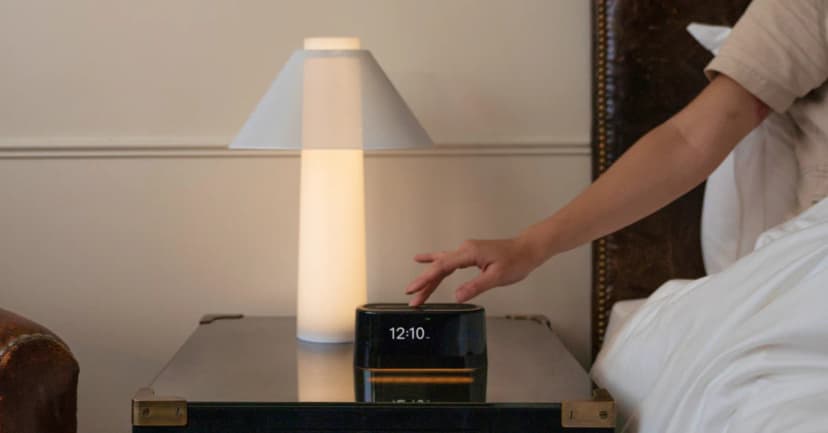Getting a good night's sleep is essential for our health and well-being. Many people struggle with sleep issues, but there are science-backed methods that can help. From understanding how sleep works to using natural supplements, there are various ways to improve sleep quality. This article explores different techniques and tools that can help you achieve better sleep.
Key Takeaways
- Understanding how sleep works can help you make better choices for your sleep habits.
- Maintaining a consistent sleep schedule is crucial for good sleep hygiene.
- Certain foods and drinks can either help or harm your sleep quality.
- Natural supplements like melatonin and magnesium can aid in better sleep.
- Using tools like sleep calculators and tracking devices can help monitor and improve your sleep.
Understanding the Science of Sleep
How Sleep Works
Sleep is a natural process that helps our bodies and minds recover. Our brains go through different stages of sleep, each with its own purpose. These stages help us feel rested and ready for the next day.
The Stages of Sleep
There are four main stages of sleep:
- NREM Stage 1: Light sleep where you drift in and out.
- NREM Stage 2: Deeper sleep where your body starts to relax.
- NREM Stage 3: Deep sleep that is crucial for feeling refreshed.
- REM Sleep: This is when you dream, and your brain is very active.
Circadian Rhythm
Our bodies have a natural clock called the circadian rhythm. This clock tells us when to sleep and wake up. It is influenced by light and darkness. Keeping a regular sleep schedule helps keep this clock in sync.
Understanding how sleep works and the stages of sleep can help you improve your sleep quality. Keeping your circadian rhythm in balance is key to feeling your best every day.
Effective Sleep Hygiene Practices
Maintaining a Consistent Sleep Schedule
Keeping a regular sleep schedule is crucial for good sleep hygiene. Going to bed and waking up at the same time every day helps regulate your body's internal clock. This consistency can make it easier to fall asleep and wake up feeling refreshed.
Creating a Relaxing Bedtime Routine
A calming bedtime routine can signal to your body that it's time to wind down. Consider activities like reading a book, taking a warm bath, or practicing gentle yoga. Avoid screens and bright lights, as they can interfere with your body's natural sleep signals.
Optimizing Your Sleep Environment
Your sleep environment plays a significant role in the quality of your sleep. Ensure your bedroom is cool, dark, and quiet. Investing in a comfortable mattress and pillows can also make a big difference. Additionally, consider using blackout curtains or a white noise machine to create an ideal sleep setting.
Good sleep hygiene is a form of self-care that can lead to better overall well-being. When you prioritize your sleep, you're more likely to wake up feeling happy and ready to take on the day.
The Role of Nutrition in Sleep Quality
Impact of Caffeine on Sleep
Caffeine is a well-known stimulant that can significantly affect your sleep. Consuming caffeine too close to bedtime can make it difficult to fall asleep and stay asleep. It's best to avoid caffeine at least six hours before you plan to go to bed. This includes not just coffee, but also tea, soda, and even some medications that contain caffeine.
Foods That Promote Better Sleep
Certain foods can help you sleep better. Foods rich in tryptophan, like turkey and dairy products, can promote sleep. Additionally, foods high in magnesium, such as leafy greens, nuts, and seeds, can also improve sleep quality. Here are some foods to consider:
- Turkey
- Dairy products
- Leafy greens
- Nuts and seeds
Hydration and Sleep
Staying hydrated is important, but drinking too much water before bed can lead to frequent trips to the bathroom, disrupting your sleep. Aim to drink most of your fluids earlier in the day and reduce intake a few hours before bedtime.
A balanced diet and proper hydration can make a significant difference in your sleep quality. Small changes in what and when you eat can lead to better rest and overall health.
Natural Sleep Aids and Supplements
Melatonin: Benefits and Dosage
Melatonin is a hormone that helps regulate your sleep-wake cycle. Taking melatonin supplements can help you fall asleep faster and improve sleep quality. It's often used for jet lag or shift work. The typical dosage ranges from 0.5 to 5 mg, taken 30 to 60 minutes before bedtime. Start with a lower dose to see how your body reacts.
Magnesium for Sleep
Magnesium is a mineral that plays a role in muscle relaxation and stress reduction. It can help you fall asleep and stay asleep. Foods rich in magnesium include leafy greens, nuts, and seeds. You can also take magnesium supplements, but start with a small dose to avoid digestive issues.
Other Effective Sleep Supplements
Several other supplements may help you relax and sleep better, including:
- Valerian root
- Chamomile
- Glycine
- Omega-3 fatty acids
- Zinc
While these supplements are not a magic solution, they can be useful when combined with other sleep strategies. Try them one at a time to see how they affect your sleep and to avoid any negative reactions.
Combining natural sleep aids with good sleep hygiene practices can significantly improve your sleep quality.
Tools and Products to Enhance Sleep
Sleep Calculators
Sleep calculators can help you figure out the best time to go to bed and wake up. They work by calculating sleep cycles, which usually last about 90 minutes. By waking up at the end of a sleep cycle, you feel more refreshed. You can find many sleep calculators online or as apps for your phone.
Sleep Tracking Devices
Sleep tracking devices monitor your sleep patterns and provide insights into your sleep quality. These devices can be worn on your wrist or placed under your mattress. They track metrics like heart rate, breathing, and movement. Some popular sleep trackers include Fitbit, Apple Watch, and Oura Ring.
Comfortable Bedding Options
Having comfortable bedding is crucial for a good night's sleep. Look for mattresses and pillows that support your body and keep you comfortable. Memory foam mattresses and pillows are popular choices because they conform to your body shape. Additionally, consider using breathable sheets and blankets to regulate your body temperature.
Investing in the right tools and products can make a significant difference in your sleep quality. From sleep calculators to comfortable bedding, these tools can help you achieve a more restful night.
Lifestyle Changes to Improve Sleep
The Importance of Daytime Light Exposure
Getting enough natural light during the day can help regulate your sleep-wake cycle. Exposure to sunlight helps your body produce melatonin, a hormone that makes you feel sleepy at night. Try to spend at least 30 minutes outside each day, especially in the morning.
Exercise and Sleep
Regular physical activity can make it easier to fall asleep and improve sleep quality. Aim for at least 30 minutes of moderate exercise most days of the week. However, avoid vigorous workouts close to bedtime as they might keep you awake.
Managing Stress and Relaxation Techniques
Stress and anxiety can interfere with your ability to fall asleep. Practicing relaxation techniques like deep breathing, meditation, or yoga can help calm your mind. Consider setting aside time each evening to unwind and relax before bed.
Making changes to your lifestyle can significantly improve your sleep quality. Simple steps like getting more daylight, exercising regularly, and managing stress can make a big difference.
Addressing Common Sleep Disorders
Identifying Sleep Apnea
Sleep apnea is a serious condition where breathing repeatedly stops and starts during sleep. It can lead to daytime fatigue and other health issues. There are two main types: obstructive sleep apnea (OSA) and central sleep apnea (CSA). OSA is more common and occurs when throat muscles relax too much. CSA happens when the brain doesn't send the right signals to the muscles that control breathing.
Dealing with Insomnia
Insomnia is when you have trouble falling or staying asleep. It can be short-term or chronic. Causes include stress, anxiety, and poor sleep habits. To manage insomnia, try:
- Keeping a regular sleep schedule
- Creating a relaxing bedtime routine
- Avoiding caffeine and electronics before bed
Understanding Restless Leg Syndrome
Restless Leg Syndrome (RLS) causes an uncontrollable urge to move your legs, usually due to uncomfortable sensations. This often happens in the evening or nighttime hours when you're sitting or lying down. Moving eases the unpleasant feeling temporarily. RLS can make it hard to fall asleep or stay asleep, leading to daytime drowsiness.
If you suspect you have a sleep disorder, it's important to consult a healthcare professional for proper diagnosis and treatment.
Conclusion
Improving your sleep doesn't have to be complicated. By adopting some science-backed tips and tools, you can make a big difference in your sleep quality. Simple changes like sticking to a regular sleep schedule, getting natural light in the morning, and creating a relaxing bedtime routine can go a long way. Additionally, using sleep aids like melatonin or magnesium, and tools like sleep calculators, can further enhance your rest. Remember, good sleep is essential for your overall health and well-being. Start with small steps and gradually build better sleep habits. Your body and mind will thank you.
Frequently Asked Questions
Why is a regular sleep schedule important?
Keeping a regular sleep schedule helps your body know when it's time to sleep and wake up. This makes it easier to fall asleep and wake up feeling rested.
How does caffeine affect sleep?
Caffeine can keep you awake by blocking sleep-inducing chemicals in the brain. It's best to avoid it in the afternoon and evening.
What foods can help improve sleep?
Foods like almonds, turkey, and warm milk can help you sleep better. They contain nutrients that promote relaxation and sleep.
Is melatonin safe to use for sleep?
Melatonin is generally safe for short-term use. It's a natural hormone that helps regulate sleep, but you should talk to a doctor before using it regularly.
How does exercise impact sleep quality?
Regular exercise can help you fall asleep faster and enjoy deeper sleep. However, try not to exercise too close to bedtime as it might keep you awake.
What should I do if I think I have a sleep disorder?
If you think you have a sleep disorder, it's important to talk to a healthcare provider. They can help diagnose the problem and suggest treatments.
























